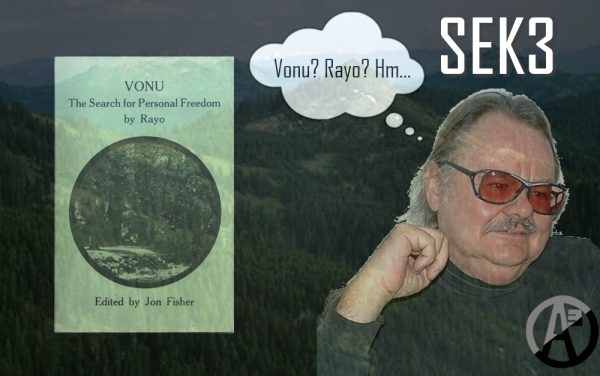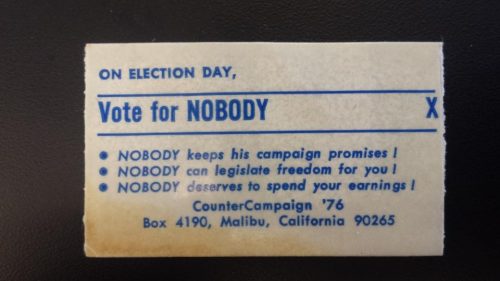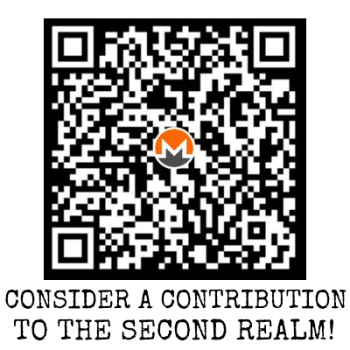Author’s Note: Four articles by Samuel Konkin will be referenced in this article. Click here to view them. Get Rayo’s book for FREE in PDF/audiobook format HERE!
Download this spoken discourse. (MP3) | Download this article (PDF).

If you were a libertarian/anarchist in the 1960s and 70s, southern California was the place to be. This bustling community was home to many ideological figures who largely developed the theory, and practice, of modern libertarian/anarchist thought.
Two gentleman, specifically Rayo (a.k.a El Rayo) and Samuel Konkin III (SEK3), also called this place home for at least some time, although they never crossed paths. Rayo is lesser-known for his development of vonu, and SEK3 is now well-known for his strategy called agorism.
Vonu, simply defined, is the hardening of one’s lifestyle to such an extent that an individual could be said to have rendered himself nearly invulnerable to coercion; vonu, itself, is an awkward contraction of the phrase “VOluntary Not vUlnerable.” This invulnerability from coercion could be defense from public coercers (governments) or private coercers (criminals).
Agorism, on the other hand, is a revolutionary market anarchist strategy that advocates the goal of bringing about a society in which all relations between people are voluntary exchanges by means of counter-economics, which is black and grey market trading; that is, “trafficking” in products and services which are either illegal, or unregulated and untaxed, but not immoral or unethical.
To put it another way, vonu is defensive, whereas agorism is offensive; much like a duality, they could be used together to mutually reinforce each other, not entirely dissimilar to a two-parent household composed of Mommy and Daddy.
Before diving into what SEK3 had to say about Rayo and vonu, let’s first compare and contrast the two individuals.
First, both were wholly apolitical, even anti-political.
Rayo chose to not participate in politics, and even went so far as to coin the terms “political crusading” and “bullshit libertarianism.” Mainstream politics itself is collective, and Rayo had a term for that too: “collective movementism”, which he was also against. From his other idea of “controlled schizophrenia” from his book, it’s safe to conclude that he would clump the political crusaders under that label as well.
SEK3 was against political crusading, as he viewed it as an inconsistent application of means and ends. In New Libertarian Manifesto, he said:
“Worst of all is Partyarchy, the anti-concept of pursuing libertarian ends through statist means, especially political parties.” (p. 7)
As far as why they both opposed this anti-strategy, they were very much in line.
Secondly, they were both freedom pioneers and developers of strategies that were outside of the political sphere. They differed in approach, but we’ll get to that in a moment.
To keep this brief, the last important commonality is that they both saw the advantages of trading in the black and grey markets.
In November 1965, when SEK3 would have been 18 years old, Rayo published an article in Innovator titled, “Self-Seeking: Ethical Enclave (Black Markets).” He defined this concept as:
“An ethical enclave is defined here as voluntary transactions between individuals who are living under a collectivist government, when such transactions are conducted independent of that government. ‘Ethical’ denotes the distinguishing characteristic of the participating individuals: an adherence to the ethical principle of voluntarism…And ‘enclave’ denotes physical emersion within a philosophically alien society.”
Sounds awfully similar to agorism, right? More on this later—you’re going to want to keep reading.
So, where did these two individuals differ?
To start with ideology first, Rayo was not an anarchist—unfortunately, as we discovered in one of his articles, he saw all anarchists as folks who use retaliatory force against the rulers. From the articles that will be discussed momentarily, we also learned that the individuals in the Free Isles Project agreed upon a nominal State.
Konkin, on the other hand, was an openly-avowed anarchist—nothing else needs to be said on that note.
Next, they differed in strategy—Rayo’s interfacing with the public was in the form of newsletters and other such publications; as can be ascertained from his book, he didn’t have a whole lot of patience for folks and was more of a hermit.
SEK3 was a quite a bit different though—not only did he openly admit that he didn’t pay taxes in a debate with Robert Poole, but he had much more of a public presence—he spoke at conferences, wrote books, and pursued culture jamming efforts, such as the CounterCampaign ’76.
It’s safe to say that these two individuals’ approaches varied drastically on this point.
Lastly, Rayo saw mobility as being crucial. He lived as a “van nomad” for awhile, and then pursued wilderness vonu, both methods containing the option to pick up and leave quickly. He also discussed country shopping and minimalist sailboating, which are more evocative of Hakim Bey’s idea of Temporary Autonomous Zones, rather than a fixed geographical locale.

SEK3 was different—as we will get to momentarily, he had some disparaging things to say about vonuists. In one article, he wrote, “As for me, anarchy begins at home.”
His goal was to recruit individuals to practice in the counter-economy, and he felt like that was best done through face-to-face discussions and conferences. He also believed that doing so in a permanent (or semi-permanent) location was most efficacious, rather than living as a nomad or “retreating,” as he would put it.
All of that said, I’d like to tie up one loose end before moving forward.
In passing, I mentioned and defined Rayo’s concept known as ethical enclaves, which is strikingly similar to that of SEK3’s agorism.
I initially posited in Vonu Podcast #1: An Introduction to Vonu that it is reasonable to believe Rayo had some sort of an impact on SEK3’s formulation of agorism. That said, the day of recording the episode, there was no “hard evidence” of that, let alone any evidence that SEK3 was even aware of this pseudonymous individual named Rayo.
I got a wild hair and decided to scour the “interwebs” for any possible connection—aha! There they were.
From January-June 1975, SEK3 published four articles in the Southern Libertarian Review, mostly in the vein of now-libertarian history, as well as some details on the formation of the anti-libertarian “Libertarian” Party, all referencing Rayo and/or vonu specifically.
1) In his article titled, “Anarchozionism,” he discusses the earlier referenced Free Isles Project and goes into some detail about how it came about. SEK3 said:
“The Preform crowd either Browned out or went into escapist trips such as becoming nomads, troglodytes, or wilderness dwellers. They sought ‘invulnerability to coercion’—or vonu—and PREFORM-INFORM became Vonulife. Recently it sputtered to a halt, and the paranoia freaks drifted back to civilization.”
From that, we can gather that SEK3 was familiar with the vonuans and their goals, likely from the publications themselves. As can be seen, his perception of them was quite gloomy to say the least.
2) He published another article in March of 1975 titled, “Carrots And Sticks,” wherein he highlights the achievements of various individuals he’s fond of and recommends. He gets to a portion of folks that he is not so familiar with:
“Before I leave Southern Calif., let me not slight anyone, but simply affirm that there are many libertarians I know well enough to exalt but who have not the general fame for their less persistent endeavors (generally due to working for a living, an affliction found rarely on the E. Coast). And there are others of fame that do not enjoy my personal knowledge, such as Joe Galambos, Natallee Hall and Skye D’Aureous, El Rayo and Naomi Gatherer, and Lou Rollins, whose good and worthy efforts will someday earn them a more adept chronicler.”
At The Vonu Podcast, our conception of Rayo during the 1960s and 70s is that he was not very well-known—it seems like he was part of an extremely niche crowd, and, if he enjoyed fame, it was not by the popular definition.
That being said, the way SEK3 phrases that last portion is interesting: is it possible that Rayo was more popular than we originally assumed? Were (or are) there more vonuans than we assumed there to be?
Also, have we been wrong in claiming that Rayo’s freemate’s name was “Roberta,” and, rather, it was “Naomi?” Was that the pseudonym beneath another pseudonym that she provided Benjamin Best? A little less significant, sure, but with the sparse information available, unfortunately, I don’t think we are the “adept chroniclers” that SEK3 was referring too.
3) For those who are deeply interested in libertarian history, SEK3’s article, “Libertarian Strategy (1),” may be of interest to you. Herein, there are two different mentions of vonu, specifically publications. Here’s what he had to say:
“So that we are not condemned to relive it, let’s review our history. As of December, 1968, libertarian strategy was directed either toward influence of the conservatives or conversion of the independents. It was wholly educational or retreatist. Robert LeFevre’s Rampart College, Leonard Read’s FEE, Joe Galambos’ FEI, Nathaniel Branden’s NBI, F. A. Harper’s IHS, and Frank Chodorov’s ISI were all educational institutes. The VonuLifers, Atlantis group, and Oliverites were seeking escape. Except for the LIBERAL INNOVATOR’s leafletting of the Cow Palace in 1964, no libertarians were involved in a political campaign except as deviationist individuals. Many supported Nixon in 1968, but they were clearly of conservative leanings.”
…
“Many libertarians also turned inward with incessant psychology sessions and in-group self-criticism. This was the Movement as reflected in 1972 in, say, NEW LIBERTARIAN NOTES, and which could be pieced together from RAP, LIBERTARIAN FORUM, REASON, ACADEMIC ASSOCIATES LETTER, VONULIFE, FREEMAN, SIL NEWS, PACIFIC LIBERTARIAN, and many local newsletters. “
Regarding the first quote, SEK3 is quite accurate in stating that VonuLifers were seeking escape. Although, Rayo does discuss vonu in cities, he notes that, “I know of quite a few vonuists and libertarians who live [Allen] Humble’s way, but I know none who seem to like it for very long.”
This is mainly due to the city psychological pressures of the statist-servile society, which is why he prefers “to live far enough back in the woods.” Other than that minor point, SEK3 is correct.
The second excerpt is particularly interesting, though. Unfortunately, the only VONULIFE articles I have read are those found within Rayo’s book. From that, I certainly don’t gather the “incessant psychology sessions” or “in-group self-criticism.” Rather, from the entirety of the book, it mainly consists of back-and-forth discussions on strategy, much like a forum or Facistbook thread.
I’m not sure what SEK3 was referring to here, but it’s definitely possible that he’s correct—until we acquire a library of those publications, we’ll just have to take his word for it.

4) This last article discusses CounterCampaign ’76, which was a culture jamming effort encouraging people to “Vote for Nobody!,” much like the one that took form this most recent election cycle. Sarcastically, SEK3 writes:
“And who could we all agree on without sacrificing our principles? Behind whom could students of Murray Rothbard, Robert LeFevre, Ayn Rand, Leonard Read, Joseph Galambos, Karl Hess, Robert A. Heinlein, El Rayo, Natallee Hall, and Harry Browne unite? Nobody.”
On a slight tangent, it is pretty f****** cool to see Rayo’s name alongside Rothbard, Rand’s and Hess’. SEK3 is definitely right though—sure, a similar foundation of principles was adhered to by most of these folks, but the minor differences weren’t as minor as would be perceived by the casual statist observer.
The only solution is NOBODY!
So, what’s the takeaway?
- SEK3 was familiar with Rayo, even if only through the various publications they both read/contributed to;
- Agorism was likely developed based upon Rayo’s formulation of ethical enclaves;
- They differed in strategy, and were both particularly harsh towards those they disagreed with—that said, they were more alike than not;
- The history of libertarianism (even within the last 40 years) is chockful of fascinating details.
In closing, we believe that vonu and agorism go hand-in-hand, and offer an extremely powerful solution to the institutionalized coercion brought about by the State, as well as the non-institutionalized coercion brought about by those private criminal syndicates.
Hell, Rayo even included ethical enclaves (trading in the black/grey markets) as a potential option for vonuans, but more so in pursuing financial independence and tax minimization, rather than the revolutionary agorism set out by SEK3 as a means of abolishing the State; because, remember, vonuans are more than happy to “co-exist” in protracted conflict with the State.
Sure, there are differences, but “we” are all individuals—that is the beauty of vonu—it is truly yours for the making.
For more information, please check out The Vonu Podcast. Please share this around, post it on your blogs, talk about it on your podcasts, etc.!
Want MORE?! Subscribe to The Vonu Podcast!



11 Replies to “Samuel Konkin III (SEK3) on Rayo and Vonu: Different Approaches?”